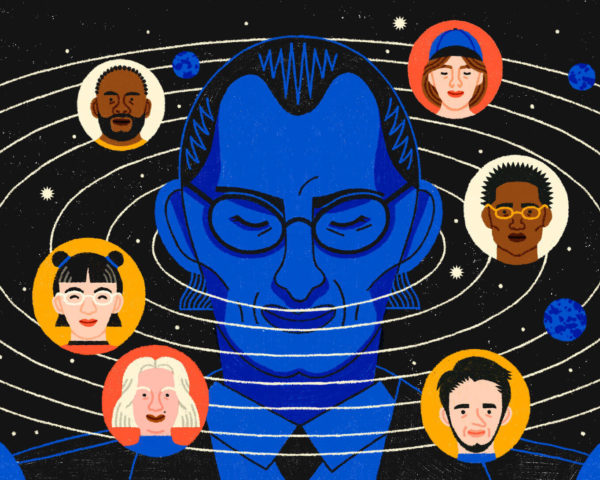Dan Pink is the author of several bestselling books about business, work, creativity, and behavior including Drive: The Surprising Truth About What Motivates Us, To Sell is Human: The Surprising Truth About Moving Others, and The Power of Regret: How Looking Backward Moves Us Forward. Pink is the host of a popular Masterclass course on persuasion and currently publishes a column in the Washington Post called “Why Not”.
Dan was a guest and speaker at Team ’24, and sat down with us for an interview.
Your “Why Not” series explores new opportunities in society such as, “Why not pay teachers $100,000?” and helps open up the cultural conversation about what could be.
However, you said in your column that oftentimes the voice of the cynic rings the loudest, and it can unduly shut down good ideas. Can you tell me more about the impacts of cynicism?
We have research on this. There’s this phenomenon called the “cynical genius illusion”. It is that people who are cynical are perceived as smarter, in the same way that people who are negative are perceived as smarter.
So we have this biased thinking that cynicism and negativity makes somebody smarter. And the thing is, that’s not true.
The cynical genius illusion is so insidious for civic society and also for organizational society. The better predictor of intelligence is the trait, not so much of optimism, but of openness.
Sometimes when you’re open, you come to the conclusion, ‘You know what, that’s not a great idea’. and that’s okay that’s part of the process.
And so one of the principles of the “Why Not” column is curiosity or conversion. We’re not trying to convert anybody to a specific idea. We’re just trying to be curious and see where the conversation takes us.
The better predictor of intelligence is the trait, not so much of optimism, but of openness.
Are there any ways that people can identify if they’re being too cynical?
One of the questions you can ask yourself when you make a decision or you’re thinking about something is, “Why might I be wrong?” So if you find yourself naysaying an idea your colleague pitches you, think through some reasons why it might not be true that the idea would fail, or is misguided, etc.
I think the other thing you can do is: don’t fall for the cynical genius illusion. Don’t think that someone who’s cynical is automatically smart.
What do you think a no-cynicism workplace would look like?
I wouldn’t advocate for a “no cynicism” workplace. I want to have significantly reduced cynicism in the workplace. I don’t think we should eradicate it entirely. But I think it’s become overwhelming to many organizations.
At work our default setting should be open, not closed. Our default setting should be to assume positive intent rather than assume negative intent. Assuming negative intent is another expression cynicism.
It sounds like you would advocate for asking “Why not” in the workplace, too.
Yes, and I think the question is: Do you want to be deconstructive or constructive?
One reason I chose the path I did is that I was trained as a lawyer early in my life. When I went to law school, one of the things that frustrated me was that people became very adept at taking something that is a bit wobbly or shaky and knocking it down completely instead of building it back up. That skill we learned was, in some ways, deconstructive, and that was not how I saw the world.
I don’t believe in endless heedless, boundless, optimism. I believe in assuming positive intent, and in being open and in trying stuff, but also being hard-headed enough to dispense what’s not working.
I think you’re better off being constructive, but it’s really a matter of balance. I don’t believe in endless heedless, boundless, optimism. I believe in assuming positive intent, and in being open and in trying stuff, but also being hard-headed enough to dispense what’s not working.
What should the process of asking “Why not” at work look like? How should people have these conversations?
I think what you want is to prioritize curiosity over certainty. As humans, we want certainty. And there’s a certainty in saying no to a new idea: the certainty that it won’t fail. But what does that achieve for you?
That’s why I have become a bigger believer in small experiments. Try it. If it works, keep doing it. If it doesn’t work, don’t do it.
You cannot just opine. When you present an idea, you want data, you want experts. You even want to talk about some of the flaws in your idea to invite conversation. You have to actually find people who are willing to think about this, look at the numbers, and show people that it is possible. But you also have to be reasonable. You can’t be Pollyannish about it.
You have to say you know what, here’s a reason that it won’t work. For instance, paying teachers $100,000 a year is extremely expensive. Okay, we gotta acknowledge that.
Here’s the thing: You’re not trying to convert people. You’re trying to engage people. You’re not trying to deliver the last word, trying to deliver the first word.
Going back to your series in The Washington Post. What have you learned about society and our optimism or lack thereof?
I’ve learned a number of different things. The first is that when you push back against cynicism, you actually don’t get a lot of resistance. The door of cynicism is not this steel door that you can’t push, it’s a pretty lightweight door. Most people when you start having a conversation about it are willing to at least entertain it. They like having the conversation about it.
The other thing that I’ve noticed is that there’s much greater receptivity to new ideas than I would have suspected. We already have received over 3,000 “Why not” ideas from our readers. It’s incredible. Because people want to participate in that so I think that there’s a receptivity out there.
The third thing is that most big things are really complicated. My article on why we should raise teacher salaries to a minimum of $100,000 got a lot of love. And a lot of pushback from different sides; it’s hard to pay all teachers that amount of money.
For me though, I look at this as a way to move the conversation forward. I’m not going to solve any of issues. I’m not gonna come up with a perfect solution in any of these columns. But what I can do is try to push the conversation forward a little bit and then other people other people pick up on it.
It sounds like just prompting the question, “Why not?” can bring people out of the woodwork, and maybe resources emerge that you didn’t even realize you had.
Yeah, exactly. The other thing about it is that people will build on the idea too. So one of the principles of this column is to not have the last word, to not make decisions about these “Why not” topics. The goal is to have the first word. To start the conversation.
I think that you have a lot of loud, mean, cynical people, but there’s a distinct minority, and the majority are good, decent, thoughtful people who want to make the world better.





 )
) 








































